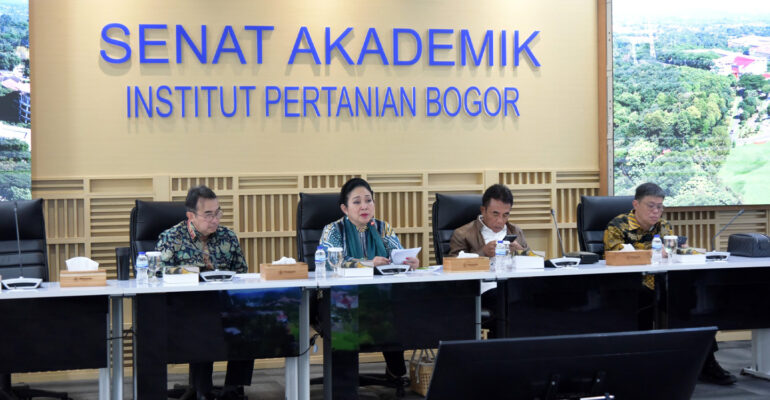Six Professors of IPB University Deliver Input on Food RUU to Commission IV DPR RI

IPB University received a working visit from Commission IV of the House of Representatives (DPR) RI, Thursday (5/8). This visit was in the context of collecting initial input on the preparation of the RUU on the Third Amendment to Law Number 18 Year 2012 on Food.
On that occasion, six professors of IPB University each delivered strategic views to strengthen a sustainable, independent, and sovereign national food system.
Chairperson of Commission IV of the House of Representatives, Siti Hediati Soeharto, SE emphasized the importance of drafting this RUU as part of the National Legislation Program (Prolegnas) Priority Year 2025.
“We organized a focus group discussion (FGD) to capture the opinions of academics. IPB University was the first institution we visited because of its enormous contribution and reputation in the food sector,” she said.
Vice Rector of IPB University for Research, Innovation, and Agromaritime Development, Prof Ernan Rustiadi welcomed the group of Commission IV and explained a number of current national food challenges.
“The national food system must face megadisruptions such as climate change, pandemics, and geopolitical conflicts. IPB University is ready to contribute in drafting the Food RUU based on research and innovation,” said Prof Ernan.
Perspectives of Six Professors of IPB University
Departing from concerns about the condition of national nutrition security, IPB University academics across the field emphasized the importance of a comprehensive approach to the food system. Starting from the aspects of production, distribution, to consumption and fulfillment of community nutrition.
Prof Drajat Martianto, Chairman of the International Research Institute for Food, Nutrition and Health emphasized that the food system must cover aspects of production to consumption and the nutritional status of the community.
“This RUU must touch the root of the problem from the rice fields to the dinner table,” he said. He conveyed several main proposals, namely strengthening local food production, food reserves, access to nutrition for poor households, and protection against redistribution of food suitable for consumption.
Meanwhile, Prof Bayu Krisnamurthi highlighted the importance of making the Free Nutritious Meal (MBG) program an integral part of the national food system. Thus, the definition of food must be interpreted more broadly, from being seen only as a commodity, to an integrated unit with the nutritional needs of the community.
The Agribusiness Policy Expert at IPB University likens this integral concept to “nasi rames”. This means that the term food should be meaningful only if it is complete and balanced in nutritional content.
“Developed countries have already abandoned the concept of food as a commodity. We must also move in that direction: that food is nutrition,” he said.
Prof Luki Abdullah from the livestock sector said that land allocation for livestock in Indonesia is still very minimal. “If palm oil can have a special area, why not food? We need biomass and livestock areas,” he said. He also proposed that the Food RUU regulate post-mining areas as new production spaces.
On the agronomy aspect, Prof Edi Santosa underlined the importance of land ownership and consolidation. “Without land, there will be no food,” he said. The Chairman of the Agronomy and Horticulture Study Program at IPB University also proposed a results-based subsidy model, early food education, and the establishment of a national food information system.
“Farmers can report crop yields through an application, so that food surpluses and deficits can be monitored accurately,” he said when proposing the establishment of a national food information system.
On the other hand, Professor of Animal Health, Prof Bambang Purwantara conveyed the urgency of revitalizing the Animal Health Center (Puskeswan) and strengthening livestock breeding centers. He also highlighted the importance of providing animal protein from within the country.
“If we talk about food, it’s not just about staples, but also side dishes such as meat, eggs, and milk,” he said.
Prof Yonvitner as Chairman of the Center for Coastal and Marine Resources Studies (PKSPL) also emphasized the importance of attention to the fisheries sector, especially to small fishermen.
“Currently, we are only able to fulfill our need for marine protein for eight months. This is a crisis. This means that to strengthen national food security, support for small-scale fishermen and the aquaculture sector must be increased,” said the Professor of Marine Sciences at IPB University.
He proposed a strategy of self-sufficiency in marine protein through shallow sea cultivation and rearrangement of the distribution system of fishery products. (Fj) (IAAS/PRP)


